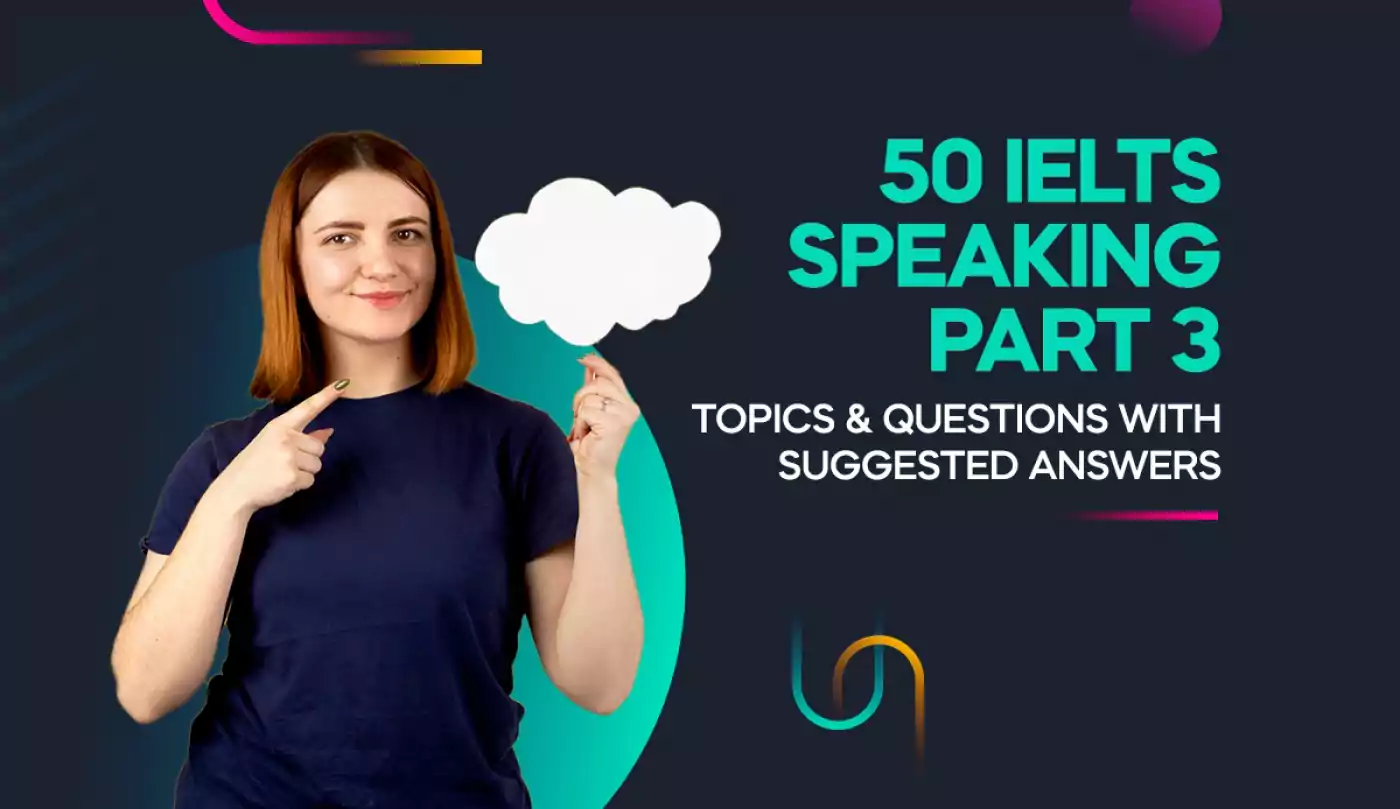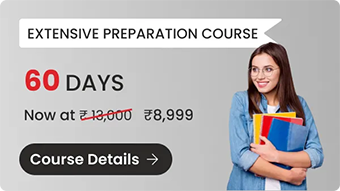• IELTS
50 IELTS Speaking part 3 Topics & Question with suggested answers
19920 Reads
3 min Read
- IELTS Speaking section lasts 15-20 minutes and is broken into three sections.
- IELTS Speaking Part 3 questions are typically based on opinion, hypothetical, benefits, and future.
- IELTS Speaking Part 3 requires more practice and confidence as it is comparatively difficult.

The IELTS examination is the basic requirement if you want to study abroad, and IELTS Speaking Part 3 is a difficult task compared to others. The Speaking module of The IELTS is a speech-based section that assesses the candidate’s English speaking skills.
It is typically the longest part of the speaking module. However, if you present your ideas in a format, you may be able to do so effectively.
This guide will teach you everything about IELTS Speaking Part 3, including Structure, suggested topics and their answers, and strategies. Get ready to practice and ace the IELTS speaking section.
IELTS Speaking Part 3 Structure
The IELTS examination has four sections and assesses the candidate’s English language proficiency through Writing, Listening, Reading, and Speaking. The academic and general IELTS speaking section consists of an interview that lasts between 15 and 20 minutes and is divided into three sections.
- PART 1: This section contains several general/introductory questions; you must respond with at least two sentences.
- PART 2: The second portion is an extempore in which you will be given a topic to research. This portion requires one minute for preparation and two minutes for speaking.
- PART 3: The follow-up questions or the test's final section are solely based on the second section's subject. For IELTS Speaking Part 3, two-way interaction with the examiner lasts for around 4-5 minutes.
List of Topics on which the IELTS Speaking Part 3 questions are based
| Work | Study | Hometown |
| Home | Reading | Birthdays |
| Hobbies | Clothes | Shopping |
| Computers | Dictionaries | Events |
| Neighbours & Neighbourhoods | Flowers | Going out |
| Happiness | Childhood | Internet |
| Leisure time | Music | Family & Friends |
| Newspapers | Pets | Art |
| Daily routine | Sport | Television |
| Transport | Weather | __ |
How to Answer IELTS Speaking Part 3 Questions?
- You will have a lengthy conversation with an examiner for about 4-5 minutes in the third segment, during which you will be questioned on a broader range of topics connected to those studied in IELTS Speaking part 2. The examiner will extensively assess your ability to think logically, express yourself, and talk.
- Before responding, you must show interest and thoroughly consider the questions: Be mindful and sit upright.
- If the question is opinion-based, each response must have a distinct motivation and point of view: Typically, questions are open-ended, and there are no extra points awarded for having a balanced opinion, so be sure you adequately support and explain one side.
- You should expound on these responses when you offer examples: You can explain things in detail using examples. Furthermore, examples may be helpful if you only have a few reasons to support your position.
- Before the big test, base your practice on as many subjects as possible: Take on a new issue or topic every day, and focus on the reasons, terminology, and examples related to it.
Try to use the following as your format for each answer
- Opinion: Start with your opinion if asked.
- Reason: Always give a reason for choosing that as your opinion
- Example: A valid example will justify your reasoning
- Consequence: Finally, finish it with an ending, a conclusion to what you wanted to convey.
IELTS Speaking Part 3 Question & Answers
Now that you know the structure of the speaking section of IELTS and the strategies for answering IELTS Speaking Part 3, Are you ready to move to the next part? Let’s discuss some Questions and topics with suggested answers for IELTS Speaking Part 3.
Topic #1 of IELTS Speaking Part 3: Eating habits
Describe the sorts of food consumed in your nation.
In my nation, India, various food options are available. Local and international cuisines are popular among youngsters, while the adults and older generation mostly prefer traditional options. Moreover, India’s traditional food is diverse depending on the state or city you are in.
How have your nation's eating patterns changed over time?
The eating patterns of the people of India have changed and developed to the extent that many young adults avoid cooking and eat packaged food or street food, which is convenient for them. However, this is not the case for many older people, as most of their eating habits are the same as in the past.
How nutritious is the food in your nation?
The food from my country is highly nutritious, especially the traditional and local cuisines. Many people prepare lentils and vegetables daily and eat fresh food. Generally, the nutritional value is high, whereas other junk food items are also available, which have close to no nutritional value.
What do you think accounts for the differences in table manners between cultures?
Well, different cultures can influence the way we eat food. Many Indian cultures promote eating while sitting on the floor, and many advocate using hands to eat food like rice, etcetera. Even though most table manners are inculcated from the previous generation, young adults and many families today have a dining room and sit on chairs to eat.
How might dietary preferences evolve over the next few decades?
Dietary preferences can change in the future, as most people want to appear in a certain way. To have a body that is socially appreciated, one might have to exercise regularly. People might start accepting that healthier options instead of junk food should be consumed more often.
Topic #2 of IELTS Speaking Part 3: Education
In what ways have priorities changed in schooling throughout time?
The main factor in which school priorities have changed is related to co-curricular activities. Many schools now concentrate more on ways which can help students develop skills for their future. For example, computer-related skills are prevalent.
How do you feel about language teaching in schools?
Languages in schools help students understand the variants and linguistic traits a person cannot understand at home.
How might your career success be impacted by the kind of school you attend?
Moreover, one can learn more than one language at a time. Schools nowadays are competitive and want to excel at everything; however, many schools are low on financial aspects and therefore cannot excel, which is similar for people. Yes, many factors can affect the quality of a career.
What modifications will take place soon in the classroom?
Future modifications will be technology-related, as many schools want students to become independent regarding computers and other technological factors.
Topic #3 of IELTS Speaking Part 3: Environment
- Is water contamination an issue in your nation?
- What are a few factors contributing to water pollution?
- What can people do to keep the water clean?
- Do you believe the water cleanliness issues will improve?
Topic #4 of IELTS Speaking Part 3: Influence of Television
- How popular is television in your nation?
- Describe the television shows shown in your nation.
- What draws individuals to television?
- Do you prefer public or commercial television?
Topic #5 of IELTS Speaking Part 3: Influence on Youth
- What sort of people in your nation have an impact on the youth?
- Why is having role models important?
- Do you believe that the educational system in your nation has an impact on the behavior of young people?
- What kind of people—parents, instructors, friends, etc.—have the most potential to shape the behavior of young people?
Topic #6 of IELTS Speaking Part 3: Leisure Activities
- What leisure activities are famous in your country?
- What do you think will be the popular leisure activities for future generations?
- You also like to do the same things that your parents used to do in their free time?
- Why is it crucial for people to have free time to engage in recreational activities?
Topic #7 of IELTS Speaking Part 3: Shopping
- Is shopping a common pastime in your nation?
- How have consumer behaviours changed recently?
- How much does advertising influence consumers' purchasing decisions?
Topic #8 of IELTS Speaking Part 3: Sports
- Which sports are popular in your nation?
- What are the advantages of participating in sports?
- Do you believe that popular sports will change in the future?
- How can sports promote greater international understanding?
Topic #9 of IELTS Speaking Part 3: Transport
- How do most individuals in your nation travel long distances?
- Have people's preferred modes of transportation changed significantly in recent years?
- What recent changes have been made to transportation in your nation?
- Do you believe that transportation will keep getting better in the future?
Topic #10 of IELTS Speaking Part 3: Language
- What kind of quality should a language teacher have?
- What are the advantages & disadvantages of being monolingual?
- Which language is likely to become dominant in the future?
- Do you think that endangered languages should be protected or should we just let them fade away?
Topic #11 of IELTS Speaking Part 3: Politeness
- How do people show politeness in your country
- How do you deal with impolite people?
- Are people today as polite as people were in the past?
- What kinds of behavior are considered impolite?
Topic #12 of IELTS Speaking Part 3: Movies
- Do you think that the film industry has changed since you were a child?
- How do you think censorship laws will change in the next 20 years?
- As the technology for home viewing improves, do you think people will stop going to the cinema in the future?
- Should films and television be censored or should we be free to choose what we see?
Topic #13 of IELTS Speaking Part 3: Internet
- Who has a computer/ Laptop at your home?
- Do you believe everything on the internet is reliable?
- What impact does the internet have on people’s lives?
- How has the internet changed the way we work?
Topic #14 of IELTS Speaking Part 3: Love, Dating & Marriage
- Who should pay the wedding expenses? Man, woman or both? Why?
- What is the average age to get married in your country?
- Do you think it is acceptable for a man to have two wives?
- What makes a marriage successful?
Topic #15 of IELTS Speaking Part 3: Time Management
- What do you think work-life balance is important?
- Do you think older people manage their time wisely?
- What do you think is the reason behind people failing to manage their time?
- Do modern technologies make people use time up or reduce the time?
Topic #16 of IELTS Speaking Part 3: Sports and Competition
- What is your favorite sport and why?
- Do you think people should make an athlete their ideal?
- What are the benefits of international sporting events?
- Why do you think some sports fans are passionate?
Topic #17 of IELTS Speaking Part 3: Historic Place
- Do you think it is important to protect historic buildings?
- Do you think that there are alternatives available for people to learn about history other than schools?
- Do you think history will be a part of curriculum in future?
- Do you think an area can benefit from having an interesting historic place locally? In what way?
Topic #18 of IELTS Speaking Part 3: Reading Books
- What kind of books do you like to read?
- Do you think popular writers are good role models?
- If a book is based on a movie, what would you like to do? Read Book or watch a movie?
- How does our reading habit get affected as we grow up?
Topic #19 of IELTS Speaking Part 3: News and Media
- What is your opinion about the Freedom of Speech and Expression of media?
- Do you believe everything you read in the newspaper?
- What influence does news and media have on local citizens?
- How has social media changed the way we get and share the news?
Topic #20 of IELTS Speaking Part 3: Health
- Do you think older people worry more about their health?
- What else can people do to keep themselves fit except sports?
- Do you think women are more health conscious than men?
- What steps should the government take to promote a healthy lifestyle?
Topic #21 of IELTS Speaking Part 3: Money
- Do you think money management is essential?
- What do you think about the tax policies in your country?
- What do you think is the reason for poverty? Do you think it can be avoided?
- Do you think teenagers should have access to credit cards?
Topic #22 of IELTS Speaking Part 3: Advertising
- Do you think advertisements can really influence people to buy something?
- What are the positive and negative aspects of advertising?
- What are the different methods of advertising?
- What is the most popular way of advertising?
Topic #23 of IELTS Speaking Part 3: Work/Job
- For you, what is more important: salary or work environment? How do you think these factors affect work?
- What should a good employer do?
- What do you think is the reason behind people changing jobs spontaneously?
- How would you define “an interesting job”?
Topic #24 of IELTS Speaking Part 3: Friends
- Are you still in touch with any of your childhood friends?
- What do you think about why people lose connections with their childhood friends?
- What qualities are important in a friend?
- Do you think it is hard to maintain friendships?
Topic #25 of IELTS Speaking Part 3: Photography
- Do you think Photography is a good career?
- Do you like to capture moments? Why?
- What are the negative and positive aspects of digital photography?
- Do you need professional photographers for events?
Topic #26 of IELTS Speaking Part 3: Cellphones
- What do you think is the right age for children to use cell phones?
- How has the cellphone affected your life?
- Is it common for children to use cellphones in your country?
- How the use of cellphones can affect children’s behavior?
Topic #27 of IELTS Speaking Part 3: Fashion and Clothes
- How do you think fashion has evolved over the past years?
- What kind of clothes do you find comfortable?
- Do you think it is important to wear formals at work?
- Do you think dress code should be adhered to if requested on the invitation?
Topic #28 of IELTS Speaking Part 3: Foreign Culture
- What is culture shock?
- What are your opinions on your country’s culture?
- What is the best thing your culture has adopted from other cultures?
- What do you think are the benefits of learning about other cultures?
Topic #29 of IELTS Speaking Part 3: Climate/Weather
- What kind of weather does your country have?
- Do you think there has been climate change over years?
- What weather do you enjoy the most and why?
- What steps can be taken to stop the greenhouse effect?
Topic #30 of IELTS Speaking Part 3: Law
- Do you think it is important to follow laws?
- What do you think being a lawyer is a good choice?
- What qualities should a policeman have?
- Do people like being a policeman in your country?
Topic #31 of IELTS Speaking Part 3: Public Speaking
- How confident are you when it comes to speaking publicly?
- Why do you think people are nervous while speaking publicly?
- What are the qualities of a good public speaker?
- What do you think about how people can improve their public speaking skills?
Topic #32 of IELTS Speaking Part 3: Creativity & Invention
- What creative activities you used to do when you were young?
- What do you think is the best way to cultivate creativity in children?
- Do you think creativity can be learned?
- What invention has transformed your country most?
Topic #33 of IELTS Speaking Part 3: Music
- What changes do you see in today’s music and older music?
- Do you think the Internet has affected the music industry? If yes, how?
- What kind of music do teenagers in your country like to listen to?
- Is international music gaining popularity in your country? What reasons do you think are behind this?
Topic #34 of IELTS Speaking Part 3: Pets/Animals
- Do you have any pets?
- Do you think Animals have feelings or rights? Provide reasons for your answer.
- What steps should be taken to protect animals?
- What do you think about why some people do not like pets?
Topic #35 of IELTS Speaking Part 3: Family
- Who is in your family?
- Do you think it is important to have a family and why?
- Do you think having grandparents is important?
- Why do you think people do not like to live in a joint family nowadays?
Topic #36 of IELTS Speaking Part 3: Science and Technology
- What are the negative and positive aspects of improving technology?
- Do you think technology will change the way of work for people in future?
- Do you think technology makes our life easier?
- What is the difference between science and technology?
Topic #37 of IELTS Speaking Part 3: Parents and Children
- What are the children’s responsibilities towards their parents?
- What are the parent’s responsibilities towards their children?
- What do you think about single mothers?
- What is your opinion of breast-feeding in public?
Topic #38 of IELTS Speaking Part 3: Customer Service & Online Reviews
- Do you leave an online review of the product you buy?
- Do you think it is important to leave an online review?
- What is your opinion about customer-service jobs?
- Do you think it is important for companies to take customer feedback seriously?
Topic #39 of IELTS Speaking Part 3: Decisions
- What factors do you consider while making decisions?
- Do you like making quick decisions?
- Do you think quick decisions can impact your life?
- Do you think your decisions should be influenced by others?
Topic #40 of IELTS Speaking Part 3: Small Business
- Have you ever thought of setting up a business?
- How do you think large businesses affect small businesses?
- What qualities should a small business owner have?
- What are the negative and positive aspects of small business?
Topic #41 of IELTS Speaking Part 3: Punctuality
- Are you punctual?
- Why do you think being on time is important?
- How does punctuality affect people’s lives?
- What do people in your country think about people who are late?
Topic #42 of IELTS Speaking Part 3: Outdoor Activities
- Do you think Outdoor Activities are important?
- Do you think still people spend more time in outdoor activities as people did 20 years ago?
- Why do some people like to work outdoors?
- How can climate affect outdoor activities?
Topic #43 of IELTS Speaking Part 3: Old People
- How do young people treat old people in your country?
- What is your opinion about old age homes?
- Do you think old people should be taken care of at home?
- Do you think old people’s lives are better now as compared to the past?
Topic #44 of IELTS Speaking Part 3: Leadership
- Can leadership skills be taught?
- Are some people born to be leaders?
- What should a leader do to remain popular?
- Why are elected politicians often so unpopular?
Topic #45 of IELTS Speaking Part 3: Practical Skills
- That practical skills do you have?
- Do you think children should be taught some practical skills in schools?
- how can anyone learn practical skills?
- What is the importance of practical skills?
Topic #46 of IELTS Speaking Part 3: Travel and Holidays
- Where did you go for your most recent vacation?
- Has travel become safer in recent years?
- What is tourism?
- Discuss the negative and positive aspects of tourism.
Topic #47 of IELTS Speaking Part 3: Celebrities
- Who is your famous celebrity?
- What influence does celebrities have on local citizens?
- Do you think celebrities are always happy?
- How do people invade the privacy of celebrities?
Topic #48 of IELTS Speaking Part 3: School Subjects
- What subjects did you study in your schools?
- What subjects do you think should be removed and introduced in schools and why?
- What was your favorite subject during school and why?
- Do students have the liberty to choose their subjects in your county?
Topic #49 of IELTS Speaking Part 3: Social Media
- What social media apps do you use?
- What impact does social media have on the youth of your country?
- What are the positive and negative impacts of social media?
- Do you think children should have access to social media?
Topic #50 of IELTS Speaking Part 3: Pollution
- How is the air quality in your country?
- What steps should be taken to maintain the air quality?
- What do you think are companies more or less environmentally responsible now?
- What is global warming?
Conclusion
Now that you know everything you need to know about IELTS Speaking Part 3, including structure, strategies, and a few suggested answers. The provided questions will help you in the preparation of IELTS Speaking Part 3. If you still want to know more about the IELTS examination or are looking for someone to guide you, look nowhere when Canamprep - The best IELTS coaching institute is here. Contact us today!
FAQ
Get great articles direct to your inbox
The latest news, articles, and resources, sent straight to your inbox every month.
Popular Universities to Study Abroad
World class education waiting for you.


Westcliff University - Irvine Campus
California, USA • 63 Programmes
Tuition Fee : USD 21500-22000 / year
-Toronto-School-of-Management.png)
Global University Systems (GUS) - Toronto School of Management
Ontario, Canada • 7 Programmes
Tuition Fee : CAD 12000-20500 / year

Red River College Polytechnic - Winkler Campus
Manitoba, Canada • 9 Programmes
Tuition Fee : CAD 17000-18500 / year

British Education Group - The Woolwich Institute - Dubai Campus
Dubai, UAE • 5 Programmes
Tuition Fee : AED 35000-40000 / year
.webp)
University of Manitoba - Fort Garry Campus
Manitoba, Canada • 67 Programmes
Tuition Fee : CAD 17000-23500 / year

Western Community College - Surrey Campus
British Columbia, Canada • 1 Programmes
Tuition Fee : CAD 0-0 / year

Suncrest College - Nipawin Campus
Saskatchewan, Canada • 1 Programmes
Tuition Fee : CAD 20000-20500 / year
Popular English Language Proficiency Exams
IELTS Online
- Live Classes
Blogs and Articles
Curated content to keep you updated on the latest education trends, news and more.
Updated on • Jul 17,2025 05:33 PM IST • USA
PTE Accepted Universities in Australia
Updated on • Jul 17,2025 05:09 PM IST • PTE
Part-Time Jobs for International Students in Australia
Updated on • Jul 17,2025 03:44 PM IST • Australia
Updated on • Jul 12,2025 04:02 PM IST • USA
Updated on • Jul 11,2025 11:32 AM IST • Education
CPT vs OPT: Meaning, Difference, and How to Apply
Updated on • Jul 11,2025 10:40 AM IST • USA
Masters in Computer Science in UK: Top Colleges, Eligibility, Scholarships
Updated on • Jul 10,2025 11:29 AM IST • study in the UK
Highest Paying Jobs in the World
Updated on • Jul 08,2025 01:40 PM IST • Study Abroad
MBA in Australia for Indian Students: Best Universities, Requirements, Scholarship, Courses, Jobs
Updated on • Jul 08,2025 01:35 PM IST • Australia
Canada vs Australia: Which Country is Better for Indian Students in 2025?
Updated on • Jul 07,2025 12:46 PM IST • Education
France vs Germany: Which Is Better for International Students?
Updated on • Jun 30,2025 05:15 PM IST • Education
Top 10 Agricultural Universities in USA
Updated on • Jun 27,2025 05:25 PM IST • USA
Most In-Demand Future Careers in 2025
Updated on • Jun 26,2025 04:41 PM IST • Education
How Much Do Nurses Make in the U.S.?
Updated on • Jun 23,2025 03:59 PM IST • USA
Updated on • Jun 21,2025 02:00 PM IST • USA
MBA in UK: Universities, Eligibility, Types, and Career Opportunities
Updated on • Jun 19,2025 04:09 PM IST • UK • study in the UK
Scholarships in France for Indian Students
Updated on • May 29,2025 05:22 PM IST • France
Intakes in Dubai for Indian Students
Updated on • May 27,2025 03:34 PM IST • Study in Dubai
France Student Visa 2025 – Requirements, Fees, Checklist & Application Process
Updated on • May 23,2025 03:36 PM IST • France
MBA in France for Indian Students in 2025
Updated on • May 22,2025 05:35 PM IST • France
Related Blogs and Articles
A little effort to provide an authentic and reliable content for keen readers!!
Updated on • 11-04-2025 • IELTS
Describe Your Hometown IELTS Speaking Part 1 Topic
Updated on • 07-04-2025 • IELTS
PTE vs IELTS : Know the Difference and Which is Easier?
Updated on • 21-03-2025 • IELTS
IELTS Exam Dates 2025 in India
Updated on • 18-01-2025 • IELTS
IELTS Reading Practice Tests 2025: Reading Passage and Sample Questions
Updated on • 15-01-2025 • IELTS
IELTS Letter Writing Topics 2025
Updated on • 15-01-2025 • IELTS
Canada IELTS band requirements 2025
Updated on • 10-01-2025 • IELTS
Updated on • 25-11-2024 • IELTS
Updated on • 21-11-2024 • IELTS
Updated on • 02-11-2024 • IELTS
Linking Words for IELTS Speaking - Word List & Tips
Updated on • 25-10-2024 • IELTS
IELTS Writing Task 2 - Academic and General Topics with Sample Answer
Updated on • 25-10-2024 • IELTS
IELTS Writing Task 2: Tips, Lessons & Models
Updated on • 25-10-2024 • IELTS
IELTS Test Report Form (TRF): Number, Tracking, Validity and Sample
Updated on • 25-10-2024 • IELTS
IELTS Speaking Samples and Answers
Updated on • 25-10-2024 • IELTS
Updated on • 25-10-2024 • IELTS
Updated on • 25-10-2024 • IELTS
IELTS Sample Charts for Writing Task 1 Practice
Updated on • 25-10-2024 • IELTS
IELTS GT Writing Task 1/ IELTS Letter Writing
Updated on • 25-10-2024 • IELTS
Updated on • 25-10-2024 • IELTS















